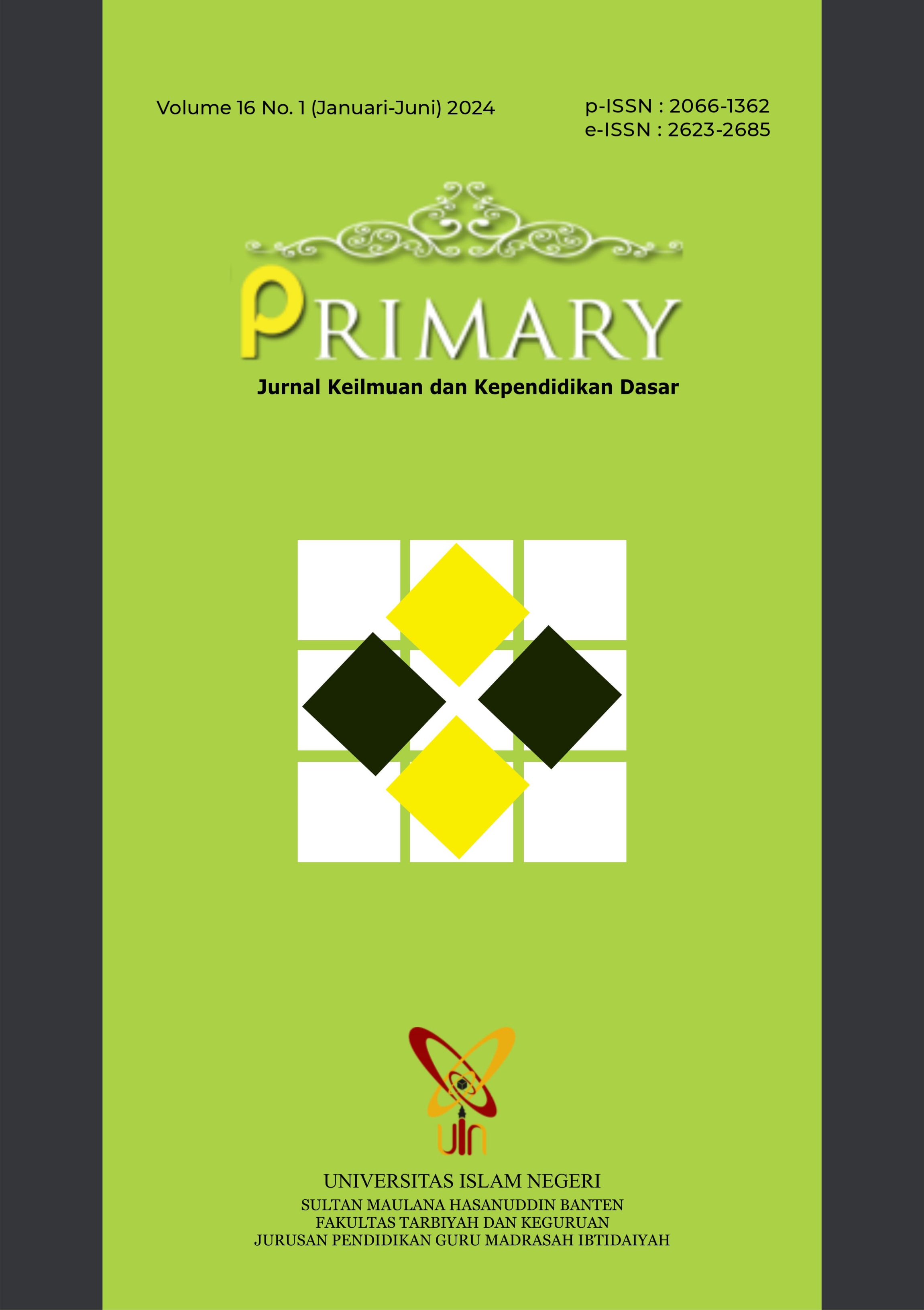PENGARUH PENGGUNAAN MODEL PEMBELAJARAN RESOURCE BASED LEARNING TERHADAP HASIL BELAJAR MATA PELAJARAN PENDIDIKAN PANCASILA KELAS IV SDN 064020
 DOI:
DOI:
https://doi.org/10.32678/primary.v16i1.10001
 Abstract viewed : 364 times
|
Abstract viewed : 364 times
|  PDF (Bahasa Indonesia) downloaded : 465 times
PDF (Bahasa Indonesia) downloaded : 465 times
Keywords:
Pancasila Education, Resource Based Learning, Learning OutcomesAbstract
Resource-Based Learning is all forms of learning that involve students in learning resources, either individually or in groups. The purpose of this research is to observe the impact of the application of the Resource-Based Learning model on the learning outcomes of fourth-grade students at SDN 064020 Sunggal in the Pancasila Education subject. The approach used in this research is quantitative, specifically a pre-experimental design with a one-group pretest-posttest design. The population in this study is the fourth-grade students of SDN 064020, with a sample of class IVA students totaling 28 students. Data collection methods include observation and tests. The feasibility of the instruments was examined before use through validity and reliability tests. The test results data were first analyzed descriptively and then followed by hypothesis testing using paired samples statistics. The results of this study indicate that the Resource-Based Learning model has an effect on students' learning outcomes in the Pancasila Education subject. This can be seen from the increase in the average learning outcomes from 47.86 (pretest) to 79.64 (posttest), and this is also reinforced by hypothesis testing which shows rejection of the null hypothesis (Ho). Another impact felt from the implementation of Resource-Based Learning is that students become more active during the learning process and the learning process becomes enjoyable
Downloads
References
Anggraeni, N. E. (2019). Strategi Pembelajaran Dengan Model Pendekatan Pada Peserta Didik Agar Tercapainya Tujuan Pendidikan Di Era Globalisasi. ScienceEdu, June, 72. https://doi.org/10.19184/se.v2i1.11796
Asyafah, A. (2019). MENIMBANG MODEL PEMBELAJARAN (Kajian Teoretis-Kritis atas Model Pembelajaran dalam Pendidikan Islam). TARBAWY : Indonesian Journal of Islamic Education, 6(1), 1932. https://doi.org/10.17509/t.v6i1.20569
Basri, H. (2023). Implementasi Kurikulum Merdeka Belajar pada Pelajaran Akidah Akhlak di MTs Negeri 1 Yogyakarta. Jurnal Murobbi Ilmu Pendidikan, Vol. 7(1), 44. doi:10.52431/murobbi.v7i1.1486
Basri, H, et al. (2023). Implementation of 21st Century Learning in the Independent Learning Curriculum at SD IT Islamic Center Deli Serdang. Education: Jurnal Ilmaih Pendidikan, 1(2), 12.
Khoerunnisa, P., & Aqwal, S. M. (2020). Analisis Model-model Pembelajaran. Fondatia, 4(1), 127. https://doi.org/10.36088/fondatia.v4i1.441
Lasaka, N. A. R., Jamaludin, & Saneba, B. (2017). Meningkatkan hasil belajar siswa melalui metode resource based learning (RBL) pada pembelajaran pkn di kelas IV SDN Sampaka. Jurnal Kreatif Tadulako Online, 5(1), 152177.
Musfirah. (2021). Pengaruh Model Pembelajaran Resource Based Learning Terhadap Motivasi Belajar Siswa di Kelas IV UPT SD Negeri 228 Pinrang.
Noor, H., Roshayanti, F., & Wakhyudin, H. (2023). Penggunaan Model PBL untuk Meningkatkan Hasil Belajar Siswa pada Materi Simbol dan Nilai-Nilai Pancasila di SDN Sendangmulyo 02 Semarang. 06(01), 41204127.
Oktari, D. (2022). Pengaruh Metode Resource Based Learning (RBL) Terhadap Peningkatan Hasil Belajar IPS Siswa Kelas IV SD Negeri 56 Pekanbaru. Jurnal Kiprah Pendidikan, 1(3), 168173. https://doi.org/10.33578/kpd.v1i3.42
Pajriah, S. (2015). Pemanfaatan Metode Resource Based Learning Dalam Pembelajaran Sejarah. Jurnal Artefak, 3(2), 147160.
Putra, M., Setiyadi Wahyu, M., Kamaludin, K., & Firmansyah, E. (2023). Implementasi Model Pembelajaran Resource Based Learning (RBL) Untuk Menigkatkan Aktifitas Pembelajaran Matematika Siswa Kelas 6 SDN 02 Dompu. GENTA MULIA: Jurnal Ilmiah Pendidikan, 14(1), 267275.
Sudrajat, A., Meiliana Lovienica, & Vina Iasha. (2021). Pengaruh Model Resource Based Learning Terhadap Hasil Belajar Ilmu Pengetahuan Sosial (IPS) Siswa Kelas IV SD Sekolah Dasar. Buana Pendidikan: Jurnal Fakultas Keguruan Dan Ilmu Pendidikan, 17(1), 7075. https://doi.org/10.36456/bp.vol17.no1.a3217
Wicaksana, A., & Rachman, T. (2018). Pengaruh Liveworksheet Terhadap Hasil Belajar. Angewandte Chemie International Edition, 6(11), 951952., 3(1), 1027.
Widiawati, A. S., & Koswara, U. (2017). Implementasi Model Pembelajaran Resource-Based Learning Berbantuan Program Geogebra Dalam Upaya Meningkatkan Kemampuan Pemahaman Konsep Matematis. Symmetry: Pasundan Journal of Research in Mathematics Learning and Education, I, 6778. https://doi.org/10.23969/symmetry.v1i1.211
Yanti, C. (2023). Penerapan Model Resource Based Learning Upaya Meningkatkan Hasil Belajar Bahasa Indonesia Siswa Kelas VI MI Negeri 2 Gowa. Student Research Journal, 1(2), 130147.
Yazidi, A. (2014). Memahami Model-Model Pembelajaran Dalam Kurikulum 2013 (the Understanding of Model of Teaching in Curriculum 2013). Jurnal Bahasa, Sastra Dan Pembelajarannya, 4(1), 89. https://doi.org/10.20527/jbsp.v4i1.3792
Yulia, P., & Natalia, D. (2020). Efektifitas Model Pembelajaran Resource Based Learning Terhadap Hasil Belajar Matematika Siswa. Nabla Dewantara, 5(1), 2430. https://doi.org/10.51517/nd.v5i1.167
Downloads
Published
How to Cite
Issue
Section
License
Copyright (c) 2024 AKSHA MULYANI SIREGAR, IRFAN DAHNIAL

This work is licensed under a Creative Commons Attribution-ShareAlike 4.0 International License.
PRIMARY JOURNAL: https://ftk.uinbanten.ac.id/journals/index.php/primaryis licensed under aCreative Commons Attribution-ShareAlike 4.0 International License
An author who publishes in PRIMARY: Jurnal Keilmuan dan Kependidikan Dasar agrees to the following terms:
- The author retains the copyright and grants the journal the right of first publication of the work simultaneously licensed under the Creative Commons Attribution-ShareAlike 4.0 License that allows others to share the work with an acknowledgement of the work's authorship and initial publication in this journal
- The author can enter into separate, additional contractual arrangements for the non-exclusive distribution of the journal's published version of the work (e.g., post it to an institutional repository or publish it in a book) with the acknowledgement of its initial publication in this journal.
- The author is permitted and encouraged to post his/her work online (e.g., in institutional repositories or on their website) before and during the submission process, as it can lead to productive exchanges, as well as earlier and greater citation of the published work (See The Effect of Open Access).
The names and email addresses entered in this journal site will be used exclusively for the stated purposes of this journal and will not be made available for any other purpose or to any other party.










